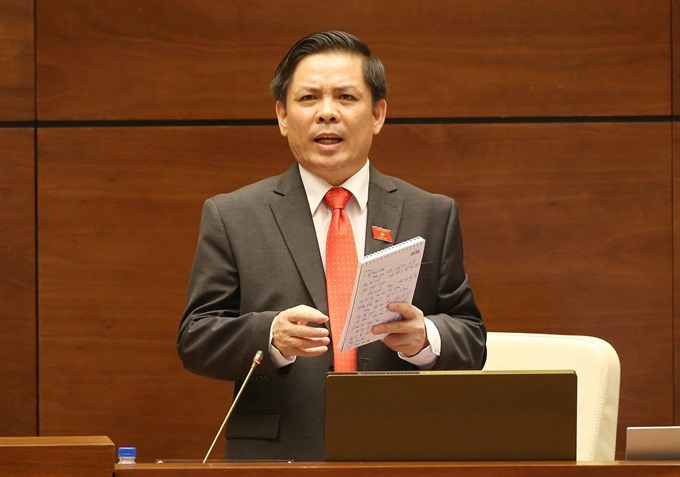 Politics & Law
Politics & Law

Over 2.8 million vehicles across the country are expected to be installed with chips that allow them to cross toll stations without having to stop by the end of 2018, said Minister of Transport Nguyễn Văn Thể during a Q&A session with lawmakers in Hà Nội this morning during a National Assembly meeting.
 |
| Minister of Transport Nguyễn Văn Thể takes the floor during this morning NA’s Q&A sessions. — VNA/VNS Photo Doãn Tấn |
HÀ NỘI — Over 2.8 million vehicles across the country are expected to be installed with chips that allow them to cross toll stations without having to stop by the end of 2018, said Minister of Transport Nguyễn Văn Thể during a Q&A session with lawmakers in Hà Nội this morning during a National Assembly meeting.
The automatic toll collecting chips are believed to be the answer to the country’s numerous issues regarding its Build-Operate-Transfer (BOT) projects, which have been criticised for being poorly planned and lacking in transparency. It will be, at the very least, a difficult order for the transport ministry to meet, as only 500,000 vehicles are equipped with the chips at the moment, according to its own report.
Those who were expecting a heated grilling session for the transport minister were not disappointed. Numerous questions were thrown at him over BOT tolls, as well as the increased number of railroad accidents and the poor quality of infrastructure projects, which ironically, were extremely expensive according to lawmakers.
Thể said his ministry would halt some 14 BOT projects on existing roads and from now on BOT projects would only be permitted when they open new roads that run parallel with existing ones to give road users a choice whether to use them or not.
He admitted that the ministry has largely failed to provide a sound and optimal legal framework for the implementation of BOT projects.
“Individuals who are found with violations and wrongdoings will be severely punished. The Ministry of Transport’s top priority is to serve the people,” said Thể. The ministry will work closely with local authorities to address any complaints and grievances over BOT tolls collection.
In one of its own reports, the ministry said the locations of some 17 BOT toll stations were found to be in violation of the law. Of which, a total of nine projects are collecting tolls from people who do not even use their services.
“How is that serving the people? Why are people being forced to pay for something they don’t use?” said Deputy Hoàng Quang Hàm, a member of the NA’s Finance and Budget Committee.
Tremendous losses
Deputies Trương Trọng Nghĩa and Cao Thị Xuân voiced their concern over the process of choosing investors for BOT projects.
“We’ve received reports from businesses that there were deals being made under the table that resulted in unfair competition, and even in monopoly. As the country’ transport minister, are you even aware that some projects ended up costing 36 times the planned budget because of that?” asked Nghĩa.
The minister claimed his ministry was following Government protocol in selecting investors for BOT projects but admitted that he was aware of waste caused by prolonged construction periods.
“According to information published by the press, 17 BOT projects in which investors were selected by the ministry caused a total loss of VNĐ20 trillion (US$870 million) to the State. How is the ministry handling this?” Nghĩa demanded the ministry to provide the public with a plan to address such tremendous losses.
During the morning Q&A session for the transport minister, deputies also voiced concerns over poor traffic in big cities across the country, as well as sloppy vehicle registration processes that allow old and unsafe vehicles to pass, and the high number of traffic accidents, especially railroad accidents in recent years. The entire session was broadcasted live on national TV.
The year of 2018 has been plagued by conflicts over BOT tolls with the issue coming in the spotlight after the Cai Lậy project, where drivers carried out protests over what they claimed to be unfair tolls imposed on them. The toll collection stations were overwhelmed by drivers and were forced to stop collecting money. Traffic on the national highway came to a standstill numerous times. — VNS




